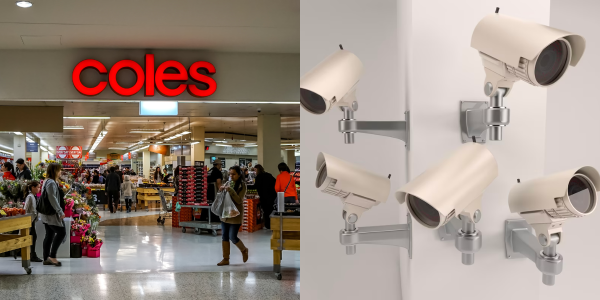Is your privacy at risk? Security changes at supermarkets spark concerns from experts!
By
VanessaC
- Replies 21
Technology has mingled its way into our everyday lives, but the convenience and advances it brings have not come without their downsides. Some of which even have implications on privacy.
Such a situation is hard to ignore, especially in the context of recent news where Coles supermarket is trialling 'innovative' security solutions such as 'smart gateway technology', which is aimed at reducing the issue of theft in its stores.
Described as a necessary move to combat the skyrocketing $9 billion-a-year issue of theft, Australia's two biggest supermarkets have started to roll out a plethora of stringent security measures.
However, some experts have voiced fears about an undercurrent of 'distrust' and even 'trauma' for some shoppers while in stores.
In an attempt to suppress criminal activity and protect staff from an apparent surge in violent behaviour, Coles has introduced various advanced technologies into its stores nationwide.
Among these are overhead cameras designed to track shoppers' every move, artificial intelligence-enabled (AI) cameras at checkouts, and 'smart gates' that automatically lock if customers try to leave without paying for their goods.
Another recently implemented strategy by Coles is the use of body-worn cameras—already familiar to some Woolworths shoppers and to others as the technology used by police and bouncers. This measure will be put to trial across Coles’ 'high-risk' stores for the projection of their staff against any type of violence.
However, privacy campaigners have not been slow in criticising these developments, indicating that such excessive surveillance could put an unnecessary burden on shoppers and disproportionately impact society's most vulnerable members, with Deakin University Senior Lecturer in Criminology, Dr Mary Ilias, warning of a culture of fear spurred by excessive surveillance.
The cameras, according to Dr Illias, may also 'exacerbate feelings of trauma and distrust' for those with vulnerabilities.
She expressed her fear of innocent people being unfairly targeted—individuals who may appear unsettled or shaky due to physical or mental conditions—causing unnecessary distress.
Retailers argue that this technology would not be put into action if customers were not happy with it.
'It's important to note that the majority of customers do the right thing in store. Measures like this are for the ones who don't,' a Coles spokesperson said.
'New technology such as body cameras is being tested by some stores here and overseas and is being done so within privacy laws and with careful attention to staff and customer feedback,' Paul Zahra, Australian Retailers Association Chief Executive said.
'It's in retailers' interests to keep their customers comfortable and at ease in stores and this kind of technology is first and foremost to keep frontline retail staff and customers safe,' Mr Zahra added.
Representatives from Coles and Woolworths have reassured their shoppers that footage from these cameras would be stored for no longer than 'a few weeks' and that their cameras complied with Australian laws on privacy.
In 2021, Woolworths also introduced a similar bold security measure for the safety of their employees and was widely praised by shoppers.
'The use of these cameras has seen a substantial reduction in the amount of abusive and physical incidents our stores team members have faced,' a Woolies spokesperson said.
Woolworths has also recently ramped up security efforts with its high-tech cameras at self-checkouts. This move has been widely criticised as customers said that the relentless surveillance on shoppers is 'completely unacceptable'.
You can read more about this here.
It's clear that some customers still feel far from being at ease with all these measures with one SDC member, @Punkywinner, saying: 'I am sorry, but I do not consent to myself or my family being recorded... they are not police officers.'
'This is an invasion of our privacy. Perhaps, if food [and] essential items were more affordable... stealing wouldn't be so prevalent!'
While other SDC members expressed their support for the supermarkets' initiatives:
'Anything that stops theft has got to be a good thing…' member @countryman said.
While member @Liz said: 'I think it is such a sad state of affairs that it has come to this, but anything to stop theft is okay in my books. I am sure they have to warn you that these cameras and sound are in place, under the privacy act.'
And member @Skeeta22 added: 'Isn't it a shame that retailers have had to resort to this? We all pay the price in the end for theft. I applaud retailers for taking this stand against dishonest people…'
Australian Privacy Foundation Vice-Chair, Dr Monique Mann, urges a reconsideration of these strategies and suggests an alternate approach that doesn't necessarily depend on surveillance.
'Let's think about why are we seeing increases in people shoplifting.'
'Why are people being aggressive towards staff? People are struggling. At the same time, Coles and Woolworths are recording massive (in excess of a billion dollars) profits amid a cost of living crisis.'
'Maybe they should think about that and try to alleviate [the] cost of living pressures rather than just expand surveillance and their profits,' Dr Mann said.
In response, Paul Zahra highlighted an often overlooked factor—the theft that costs Australian retailers an estimated $9 billion annually despite many being unreported.
'Cameras do not record personal information or have facial recognition. Any footage that is recorded is done so in line with all relevant laws and company privacy policy,' Mr Zahra noted.
'Retailers use these technologies in accordance with stringent privacy laws and have strict protocols in place.'

Members, have you seen these security measures in your local grocery? What are your thoughts on these security measures being implemented at your local supermarkets? Share your experience with us in the comments below!
Such a situation is hard to ignore, especially in the context of recent news where Coles supermarket is trialling 'innovative' security solutions such as 'smart gateway technology', which is aimed at reducing the issue of theft in its stores.
Described as a necessary move to combat the skyrocketing $9 billion-a-year issue of theft, Australia's two biggest supermarkets have started to roll out a plethora of stringent security measures.
However, some experts have voiced fears about an undercurrent of 'distrust' and even 'trauma' for some shoppers while in stores.
In an attempt to suppress criminal activity and protect staff from an apparent surge in violent behaviour, Coles has introduced various advanced technologies into its stores nationwide.
Among these are overhead cameras designed to track shoppers' every move, artificial intelligence-enabled (AI) cameras at checkouts, and 'smart gates' that automatically lock if customers try to leave without paying for their goods.
Another recently implemented strategy by Coles is the use of body-worn cameras—already familiar to some Woolworths shoppers and to others as the technology used by police and bouncers. This measure will be put to trial across Coles’ 'high-risk' stores for the projection of their staff against any type of violence.
However, privacy campaigners have not been slow in criticising these developments, indicating that such excessive surveillance could put an unnecessary burden on shoppers and disproportionately impact society's most vulnerable members, with Deakin University Senior Lecturer in Criminology, Dr Mary Ilias, warning of a culture of fear spurred by excessive surveillance.
The cameras, according to Dr Illias, may also 'exacerbate feelings of trauma and distrust' for those with vulnerabilities.
She expressed her fear of innocent people being unfairly targeted—individuals who may appear unsettled or shaky due to physical or mental conditions—causing unnecessary distress.
Retailers argue that this technology would not be put into action if customers were not happy with it.
'It's important to note that the majority of customers do the right thing in store. Measures like this are for the ones who don't,' a Coles spokesperson said.
'New technology such as body cameras is being tested by some stores here and overseas and is being done so within privacy laws and with careful attention to staff and customer feedback,' Paul Zahra, Australian Retailers Association Chief Executive said.
'It's in retailers' interests to keep their customers comfortable and at ease in stores and this kind of technology is first and foremost to keep frontline retail staff and customers safe,' Mr Zahra added.
Representatives from Coles and Woolworths have reassured their shoppers that footage from these cameras would be stored for no longer than 'a few weeks' and that their cameras complied with Australian laws on privacy.
In 2021, Woolworths also introduced a similar bold security measure for the safety of their employees and was widely praised by shoppers.
'The use of these cameras has seen a substantial reduction in the amount of abusive and physical incidents our stores team members have faced,' a Woolies spokesperson said.
Woolworths has also recently ramped up security efforts with its high-tech cameras at self-checkouts. This move has been widely criticised as customers said that the relentless surveillance on shoppers is 'completely unacceptable'.
You can read more about this here.
It's clear that some customers still feel far from being at ease with all these measures with one SDC member, @Punkywinner, saying: 'I am sorry, but I do not consent to myself or my family being recorded... they are not police officers.'
'This is an invasion of our privacy. Perhaps, if food [and] essential items were more affordable... stealing wouldn't be so prevalent!'
While other SDC members expressed their support for the supermarkets' initiatives:
'Anything that stops theft has got to be a good thing…' member @countryman said.
While member @Liz said: 'I think it is such a sad state of affairs that it has come to this, but anything to stop theft is okay in my books. I am sure they have to warn you that these cameras and sound are in place, under the privacy act.'
And member @Skeeta22 added: 'Isn't it a shame that retailers have had to resort to this? We all pay the price in the end for theft. I applaud retailers for taking this stand against dishonest people…'
Australian Privacy Foundation Vice-Chair, Dr Monique Mann, urges a reconsideration of these strategies and suggests an alternate approach that doesn't necessarily depend on surveillance.
'Let's think about why are we seeing increases in people shoplifting.'
'Why are people being aggressive towards staff? People are struggling. At the same time, Coles and Woolworths are recording massive (in excess of a billion dollars) profits amid a cost of living crisis.'
'Maybe they should think about that and try to alleviate [the] cost of living pressures rather than just expand surveillance and their profits,' Dr Mann said.
In response, Paul Zahra highlighted an often overlooked factor—the theft that costs Australian retailers an estimated $9 billion annually despite many being unreported.
'Cameras do not record personal information or have facial recognition. Any footage that is recorded is done so in line with all relevant laws and company privacy policy,' Mr Zahra noted.
'Retailers use these technologies in accordance with stringent privacy laws and have strict protocols in place.'
Key Takeaways
- Coles and Woolworths, Australia's two largest supermarkets, are implementing high-tech security measures, including AI cameras and body-worn cameras, to combat theft and violent behaviour in stores.
- Experts and privacy campaigners have raised concerns, stating that these measures could lead to a sense of 'distrust' and 'trauma' in customers and unfairly target vulnerable individuals.
- Retail advocates argue that the technology is being trialled within privacy laws and aims to protect staff and customers, with Coles stating the majority of customers do the right thing and these measures target those who do not.
- While some applaud the measures taken for staff's safety, others express concerns over privacy issues and the increasing surveillance in the stores. Dr Mann, vice-chair of the Australian Privacy Foundation, suggests retailers should consider other approaches.








